
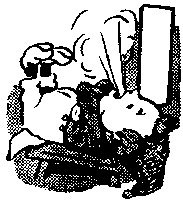
n an old typically German small town, whose peaceful image was reflected in the water of a river, there lived a poor couple by the name of Michel. Bad luck was his constant companion, and had she, a seamstress, not had her needle, life would often have been very difficult. But both of them lived in hope of better times and dreamed, as people in need so often do, of the good fortune which would one day come. For the time being, there was new trouble every day.
Their greatest worry was their son, Dilldapp. Dilldapp was a good boy, but he had a blockhead instead of a brain, so that he got everything wrong and did everything wrong. Nothing worked. Sweeties given to him by father and mother didn't help; nor were clips on his ear, clouts on his head, or bangs on his nose of the slightest use. "You dunce, you donkey, you clown, you dimwit, you buffoon", and so it went on all day long. Dilldapp was unconcerned and passed the time eating, drinking and licking plates clean, so that he became as heavy as a sack of flour, as fat as an eel, as shiny as an onion, as red as the coat of a trumpeter and as shapeless as a stuffed pug. It was very difficult to get him to move away from his seat near the fire. - "Dilldapp, bring me some wax!" And stupid Dilldapp would bring flax. - "Bring me thread!" Dilldapp would bring bread. He never brought what he was supposed to bring. Instead of a hat, he would bring in the cat; instead of a box, two cocks; instead of driving home the goat, he would arrive with a coat; instead of fetching a jar, he would return with an iron bar etc. One day his mother wanted to do the washing and called to him: "Dilldapp fetch me a bucket of water!" Dilldapp went off, and came back hours later with a barrow of mortar...
Mrs Michel took a up her heckel and gave him a blow on the head with it. It made such a loud noise that Dilldapp got a fright and ran down the stairs. He ran off, ran up hill and down dale, through forests and fields, lands and sands, sticks and stones, thistles and thorns and did not stop until he could see nothing in the darkness of the night. He had run over the sun and into the coloured window panes of the sunset. The stars hung up their thousand lanterns in the sky and the moon patrolled as nightwatchman to see who was running so desperately.
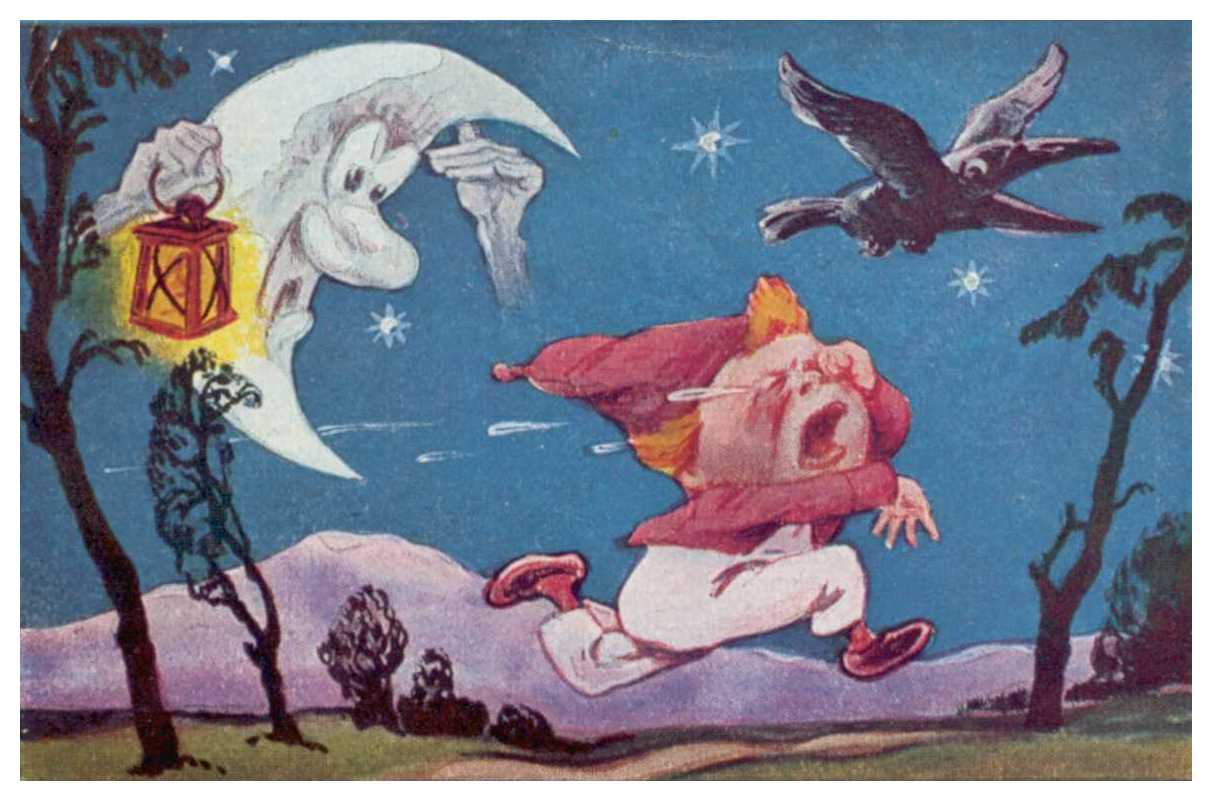 Dilldapp ran on and on. Towards morning he came to a stream. The frogs laughed at Dilldapp's stupid face and called to him: "Dilldapp, don't run across the footbridge; you would do better to jump across!" Dilldapp believed them, thought it would indeed be better; he jumped and landed in the water. Plop!! - He made quite a splash. When Dilldapp crawled out of the water, the frogs hopped back and forth over him laughing even louder than before. Now Dilldapp finally came to, stopped running, stood still in the forest and looked around him on all sides. - "You've made a fine fool of yourself, you idiot!" giggled an owl. A raven called from a nearby tree: "Hey! Dilldapp, you must be very hungry! Why don't you reach into yonder hole in the ground where you will find sugar buns!" Dilldapp believed him and stuck his hand quickly into the hole. It was a fox's den: Master Reynard was already waiting for him and took a bite out of his finger. "Ouch!" cried Dilldapp and fell over backwards in fright, right into a large antheap. The ants instantly enveloped him completely. This entertaining spectacle gave rise to great excitement. Screech-owls and finches, woodpeckers and thrushes, dragon flies and beetles, foxes and badgers chuckled and laughed; even the slow worms, lizards and toads rustled loudly and enjoyed themselves thoroughly. Ha-ha and ho-ho and quackettyquack: " You fool, you donkey, you clown, you dimwit, you buffoon!" and so it resounded with laughter on all sides in the forest. Dilldapp wormed his way out, wiped the crawling insects out of his eyes, tried to escape, stumbled and fell on to a piece of rock, as he thought. But what he had taken for a boulder was in fact a resting wild donkey of the forest, which now sprang up and off, carrying Dilldapp away on its back. So no sooner had Dilldapp more or less rescued himself from his black antheap than the donkey made off with him into a deep ravine.
Dilldapp ran on and on. Towards morning he came to a stream. The frogs laughed at Dilldapp's stupid face and called to him: "Dilldapp, don't run across the footbridge; you would do better to jump across!" Dilldapp believed them, thought it would indeed be better; he jumped and landed in the water. Plop!! - He made quite a splash. When Dilldapp crawled out of the water, the frogs hopped back and forth over him laughing even louder than before. Now Dilldapp finally came to, stopped running, stood still in the forest and looked around him on all sides. - "You've made a fine fool of yourself, you idiot!" giggled an owl. A raven called from a nearby tree: "Hey! Dilldapp, you must be very hungry! Why don't you reach into yonder hole in the ground where you will find sugar buns!" Dilldapp believed him and stuck his hand quickly into the hole. It was a fox's den: Master Reynard was already waiting for him and took a bite out of his finger. "Ouch!" cried Dilldapp and fell over backwards in fright, right into a large antheap. The ants instantly enveloped him completely. This entertaining spectacle gave rise to great excitement. Screech-owls and finches, woodpeckers and thrushes, dragon flies and beetles, foxes and badgers chuckled and laughed; even the slow worms, lizards and toads rustled loudly and enjoyed themselves thoroughly. Ha-ha and ho-ho and quackettyquack: " You fool, you donkey, you clown, you dimwit, you buffoon!" and so it resounded with laughter on all sides in the forest. Dilldapp wormed his way out, wiped the crawling insects out of his eyes, tried to escape, stumbled and fell on to a piece of rock, as he thought. But what he had taken for a boulder was in fact a resting wild donkey of the forest, which now sprang up and off, carrying Dilldapp away on its back. So no sooner had Dilldapp more or less rescued himself from his black antheap than the donkey made off with him into a deep ravine.
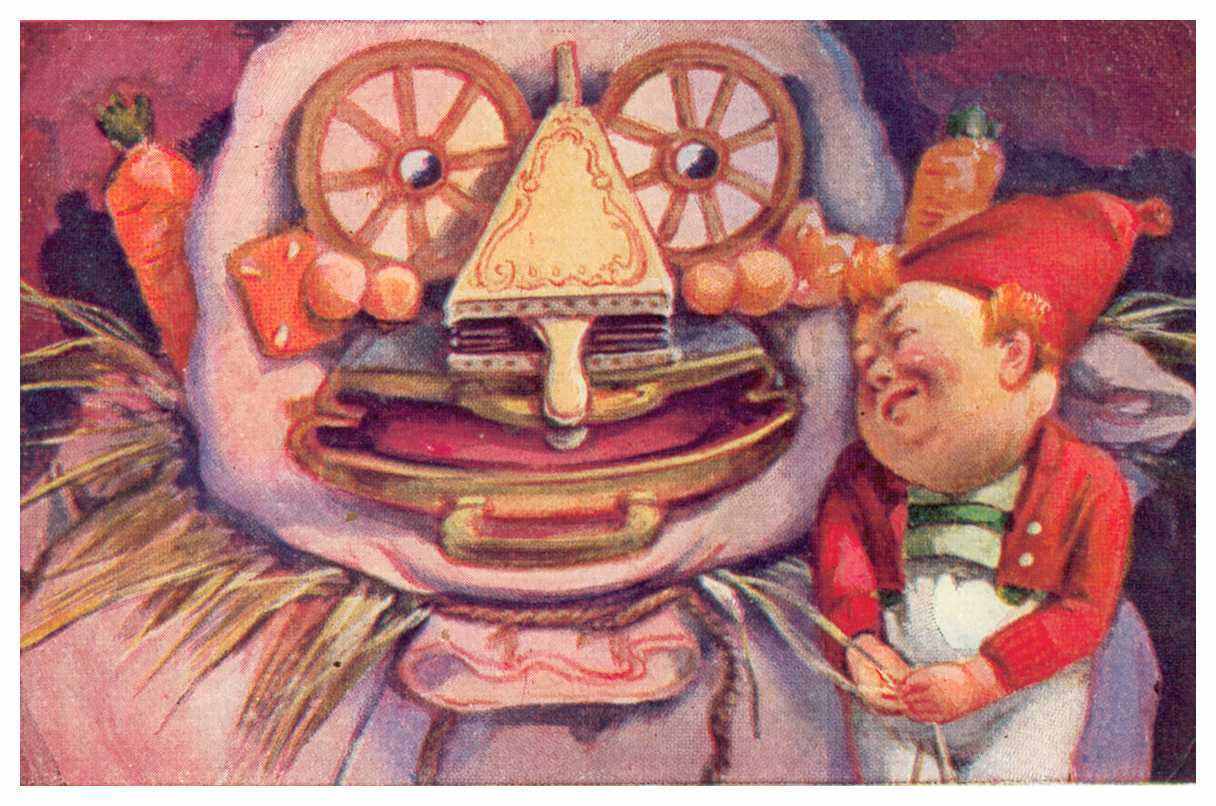 Here sat a big fat monster, magically illuminated, of such goodness of heart that it could be measured with yardsticks. - "Oh, Mummy! how horrid!" - The face of the monster was as large as a bale of pepper, its nose as wide as a bellows, its eyes as large and round as the wheels on a wheelbarrow, its mouth gaped open like the postman's bag. Dilldapp sprang off the donkey and started to talk his usual nonsense, whereupon the bogeyman realised that such foolish prattle could only come from a Dilldapp. It shook with laughter, and Dilldapp laughed as well. - "So be it! Stay here", said the monster. So Dilldapp entered into its service. All he had to do was to scratch the bogeyman's back, since it was too fat to do so itself.
But it was not ungrateful and in return scratched honest Dilldapp's back, and the two of them usually fell asleep over their labours. - After a year, the monster said to Dilldapp: "Your parents are waiting for you at home. Go back to them. You have served me faithfully and I will reward you by giving you a present of my forest donkey. But I give you this gift on one condition: you must never take hold of the donkey's tail and imagine it is the handle of a pump!" - "Thank you", said Dilldapp and set off with the donkey. In the next clearing, Dilldapp stopped. So that he would not forget what he was forbidden to do, he repeated the monster's words: "You are not to think the donkey's tail is a pump-handle!"
Here sat a big fat monster, magically illuminated, of such goodness of heart that it could be measured with yardsticks. - "Oh, Mummy! how horrid!" - The face of the monster was as large as a bale of pepper, its nose as wide as a bellows, its eyes as large and round as the wheels on a wheelbarrow, its mouth gaped open like the postman's bag. Dilldapp sprang off the donkey and started to talk his usual nonsense, whereupon the bogeyman realised that such foolish prattle could only come from a Dilldapp. It shook with laughter, and Dilldapp laughed as well. - "So be it! Stay here", said the monster. So Dilldapp entered into its service. All he had to do was to scratch the bogeyman's back, since it was too fat to do so itself.
But it was not ungrateful and in return scratched honest Dilldapp's back, and the two of them usually fell asleep over their labours. - After a year, the monster said to Dilldapp: "Your parents are waiting for you at home. Go back to them. You have served me faithfully and I will reward you by giving you a present of my forest donkey. But I give you this gift on one condition: you must never take hold of the donkey's tail and imagine it is the handle of a pump!" - "Thank you", said Dilldapp and set off with the donkey. In the next clearing, Dilldapp stopped. So that he would not forget what he was forbidden to do, he repeated the monster's words: "You are not to think the donkey's tail is a pump-handle!"
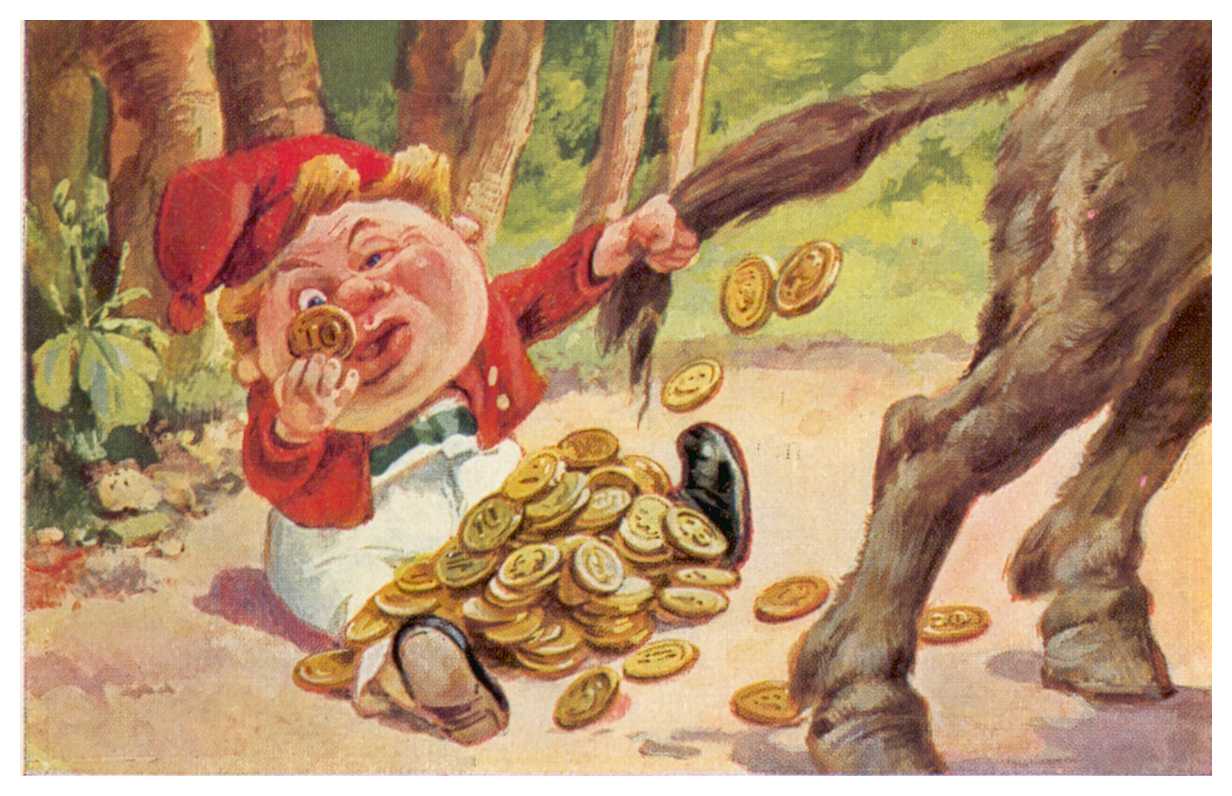 As he was recalling the words to his mind, he happened to catch the tail of the donkey and pumped. Out of the donkey fell hard, shiny, gold coins - a great number of them. Dilldapp was too stupid to be astonished. He took off his jacket, tied the sleeves together and made a money bag out of it. He rode to the next best inn, ordered a huge bowl of millet and hung his heavy money-bag over his head on the wall. Dilldapp ate to his heart's content and also fed his donkey well. When the innkeeper came with the bill, Dilldapp asked: "Good sir, what do you owe me?" "With respect and your permission," replied the innkeeper, "it is I who is to get something from you" - "How much?" The innkeeper had recognised Dilldapp for the dunce he was and told him what the bill was, explaining his calculation: "Twenty-times millet, sir, makes 25 guineas, no wine and bread - comes to 50 guineas in all; no lodgings - 75 guineas, a bundle of straw and stabling for the fine donkey - 100 guineas, my cap doffed 25 times -125 guineas; and 25 inquiries about your name comes to 150 guineas in all. - If you please!" - "That is very cheap", said Dilldapp, reaching into his money-bag. - "My goodness! What is that heavy thing you have hanging on the wall?" asked the innkeeper, "that must be a dreadful burden during your travels!" - "You are quite right, innkeeper. Would you be so good as to take the bag? You can take out the 150 guineas and throw away the rest.!" - Whereupon Dilldapp mounted his donkey and trotted off in the best of humours towards the town of his birth.
When he reached the town, he rode without delay through the narrow lanes to his parents' house, tied up the donkey and ran straight into the house. Father Michel and his mother no sooner caught sight of him than they embraced him. Dilldapp wept for joy. All at once he cried out: "My dear parents, you will never have to work again; I have brought you a donkey which will give you more gold than you have ever dreamt of. - It is waiting outside!" They both rushed out and did indeed see a donkey. Dilldapp gripped the donkey's tail, pumped and cried: "Gold! Gold! Gold!" -
As he was recalling the words to his mind, he happened to catch the tail of the donkey and pumped. Out of the donkey fell hard, shiny, gold coins - a great number of them. Dilldapp was too stupid to be astonished. He took off his jacket, tied the sleeves together and made a money bag out of it. He rode to the next best inn, ordered a huge bowl of millet and hung his heavy money-bag over his head on the wall. Dilldapp ate to his heart's content and also fed his donkey well. When the innkeeper came with the bill, Dilldapp asked: "Good sir, what do you owe me?" "With respect and your permission," replied the innkeeper, "it is I who is to get something from you" - "How much?" The innkeeper had recognised Dilldapp for the dunce he was and told him what the bill was, explaining his calculation: "Twenty-times millet, sir, makes 25 guineas, no wine and bread - comes to 50 guineas in all; no lodgings - 75 guineas, a bundle of straw and stabling for the fine donkey - 100 guineas, my cap doffed 25 times -125 guineas; and 25 inquiries about your name comes to 150 guineas in all. - If you please!" - "That is very cheap", said Dilldapp, reaching into his money-bag. - "My goodness! What is that heavy thing you have hanging on the wall?" asked the innkeeper, "that must be a dreadful burden during your travels!" - "You are quite right, innkeeper. Would you be so good as to take the bag? You can take out the 150 guineas and throw away the rest.!" - Whereupon Dilldapp mounted his donkey and trotted off in the best of humours towards the town of his birth.
When he reached the town, he rode without delay through the narrow lanes to his parents' house, tied up the donkey and ran straight into the house. Father Michel and his mother no sooner caught sight of him than they embraced him. Dilldapp wept for joy. All at once he cried out: "My dear parents, you will never have to work again; I have brought you a donkey which will give you more gold than you have ever dreamt of. - It is waiting outside!" They both rushed out and did indeed see a donkey. Dilldapp gripped the donkey's tail, pumped and cried: "Gold! Gold! Gold!" -
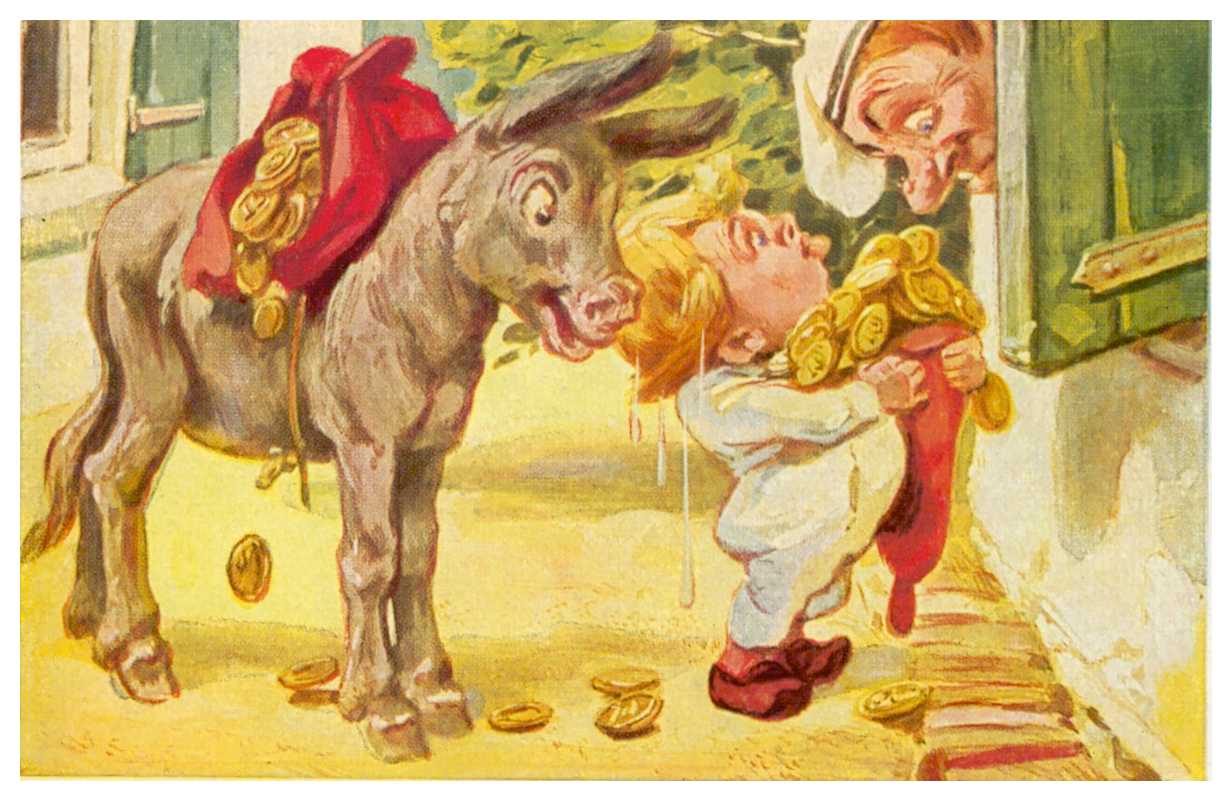 Now the news went up Welders' Lane and down Sparrows' Alley and right across the town: "Dilldapp, Michel's dunce, has brought good fortune home with him!" Indeed - children and fools can catch hold of good fortune. The whole town came running and crowded around Michels' house. The people showed their true nature: they were full of resentment and envy. Reporters and spies, tax collectors and officials from all sorts of institutions and government departments gave the Michels no peace. And things got worse and worse. Finally the police arrived full of suspicion, began to investigate and said: Ho! ... Ha! Now the Michel family realised that what they had dreamed of was not in fact great good fortune; they understood now that what is called happiness in this world is a peaceful and tranquil life, but never ever gold. - Now they wished that the magic donkey was nothing but an ordinary donkey. One morning, on his father's instructions, Dilldapp took the animal by the bridle to bring it back into the forest. The whole town followed the two of them. Some of the boys took the donkey by the tail and pumped. Loud laughter arose and they all called out: "Dilldapp, you blockhead, that is not gold: that is just donkey dung!"
Now the news went up Welders' Lane and down Sparrows' Alley and right across the town: "Dilldapp, Michel's dunce, has brought good fortune home with him!" Indeed - children and fools can catch hold of good fortune. The whole town came running and crowded around Michels' house. The people showed their true nature: they were full of resentment and envy. Reporters and spies, tax collectors and officials from all sorts of institutions and government departments gave the Michels no peace. And things got worse and worse. Finally the police arrived full of suspicion, began to investigate and said: Ho! ... Ha! Now the Michel family realised that what they had dreamed of was not in fact great good fortune; they understood now that what is called happiness in this world is a peaceful and tranquil life, but never ever gold. - Now they wished that the magic donkey was nothing but an ordinary donkey. One morning, on his father's instructions, Dilldapp took the animal by the bridle to bring it back into the forest. The whole town followed the two of them. Some of the boys took the donkey by the tail and pumped. Loud laughter arose and they all called out: "Dilldapp, you blockhead, that is not gold: that is just donkey dung!"
